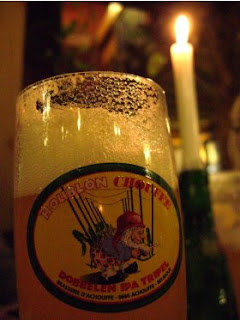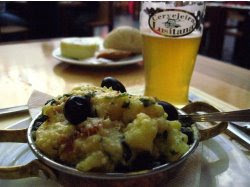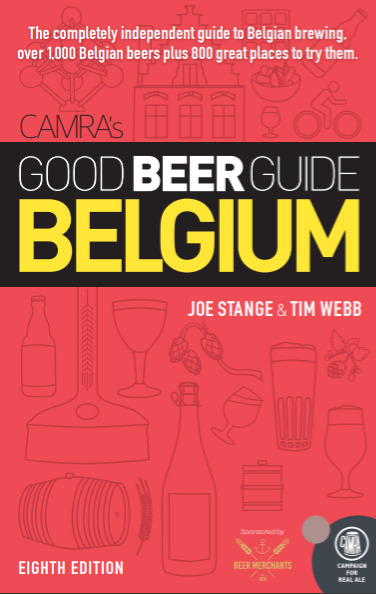When I read about something called the Port and Douro Wine Institute in Portugal, I imagined classrooms full of barrels and bottles and students sniffing glasses. Port School! Fortified Wine University. Imagine the shenanigans. Watch out for that hard-ass dean. But there were no teachers when I got to the institute's Lisbon headquarters, only a grumpy waiter who spoke no English. I speak no Portuguese, so I attempted a Spanish that's been completely ruined by my French. Oh well. He might have been the world's foremost expert on vintage single-harvest, I'll never know. At least the thickish menu was partly in English. It told little stories about the different kinds of port. I won't pretend to school you myself; look it up.
But there were no teachers when I got to the institute's Lisbon headquarters, only a grumpy waiter who spoke no English. I speak no Portuguese, so I attempted a Spanish that's been completely ruined by my French. Oh well. He might have been the world's foremost expert on vintage single-harvest, I'll never know. At least the thickish menu was partly in English. It told little stories about the different kinds of port. I won't pretend to school you myself; look it up.
I tried to leave the beer palate at home and discover this stuff with a fresh tongue. And I failed. Ports, I should have known, are challenging if you want to taste a few kinds and learn about them. Often the oldest, most esteemed (read: expensive) vintages seem to be the most cloyingly sweet. Immediately tasty, but then what? How anyone teases the complexity out of those is still beyond me. I'm sure stinky cheese helps, but that's smells like cheating. Someday I hope to sort it out.
Meanwhile, my favorite was pretty workaday. Cockburn's Extra Dry. White and cheap. Just to show how little I knew about port, I didn't realize it came in white. The waiter saw I was a neophyte and pointed to it. They give the dry stuff to the newbies and save the sweet ones for the experts? Bizarro World for a beer lover.
Anyway, I recommend a visit if you go to Lisbon -- especially if you already know something about port. Glasses start around 1.50 euro and go up from there. Nice plush chairs and a fireplace. Shame about the Michael Bolton on the stereo. Have a tasting with 10-, 30- and 40-year-old tawny from the same maker if you like.
Expect a good buzz, but not an education.
Wednesday, March 26, 2008
And We Got No Principals.
Don't Mock the Snow.
 Our first mistake: telling our guests it never snows here. As the four of us tooled around the Ardennes, flurries and sleet made intermittent appearances. We laughed it off and kept trying beers. Well, they tried beers. I was driving, until we got settled into Achouffe that evening. Then I think we hit every pub in the village... all three of them. Their quasi-Alpine, ski-lodge feel was a good fit for the weather, which we still managed to ignore. Also appropriate: the dark, malty and warming McChouffe. Getting that last bit of winter out of our systems. Or so we thought.
Our first mistake: telling our guests it never snows here. As the four of us tooled around the Ardennes, flurries and sleet made intermittent appearances. We laughed it off and kept trying beers. Well, they tried beers. I was driving, until we got settled into Achouffe that evening. Then I think we hit every pub in the village... all three of them. Their quasi-Alpine, ski-lodge feel was a good fit for the weather, which we still managed to ignore. Also appropriate: the dark, malty and warming McChouffe. Getting that last bit of winter out of our systems. Or so we thought.
Back to the brewery for dinner. I went with the regional menu: Ardennes ham, fresh trout and apple pie. But the real treat for me was the Chouffe Houblon on draft. This is an extra-hoppy tripel, 9 percent strong, that Achouffe makes it for my fellow American beer nerds and our lupulin-hooked palates. Too bad it's nearly impossible to find in Belgium. Having it kegged at the source meant a fresher hop flavor. Some spicy Thai food and a summer day would have made a better match for this beer.
I had three glasses of the stuff, trying to will away the blizzard. No luck.
We left the restaurant to find six inches on the ground. We alternately drove and pushed the car up and around a mile-long hill to our B&B. It was touch and go there for a bit. We courteously pulled aside a fallen pine tree for local drivers too scared to try the brakes. And we woke up the next morning, backs sore, to a foot of snow. In late March.
Somehow, we knew, this was Al Gore's fault.
Tuesday, March 18, 2008
Beery Wishes and Salty Fishes.
The missus and I recently went to Lisbon. Some harrowing, in-the-trenches research confirms what a few minutes of googling might tell you: There is virtually no such thing as Portuguese craft beer.
In recent years, impressive microbrews have come from Italy and Spain. But Portugal? Not yet. Two giant beer makers, UNICER and Centralcer, apparently control 99 percent of the market. It might even be 100 percent. Surprise! Most of what they make is bland lager.
Think I'm exaggerating those numbers? Unfortunately not. This 2000 news release puts the total at 98 percent. Since that time, UNICER has taken over brewing for Cervejeira Lusitana, a pub chain in Lisbon. The big boys have a choke-hold. Even so, Lusitana is a relative bright spot for Portuguese beer. So is the República da Cerveja, another faux-brewpub in Lisbon supplied by UNICER. I'll put it this way: Don't travel to Lisbon for the beer. But if you do travel to Lisbon, these places are worth visiting. Why? Two reasons: First, their lager recipes are a notch above what you'll find elsewhere in the country. Second, the food is two notches above the tourist traps noted in the usual guidebooks.
Even so, Lusitana is a relative bright spot for Portuguese beer. So is the República da Cerveja, another faux-brewpub in Lisbon supplied by UNICER. I'll put it this way: Don't travel to Lisbon for the beer. But if you do travel to Lisbon, these places are worth visiting. Why? Two reasons: First, their lager recipes are a notch above what you'll find elsewhere in the country. Second, the food is two notches above the tourist traps noted in the usual guidebooks.
The salty local cuisine really brings out the strengths of these light, refreshing beers, which are nice for the warm-weather climate. The highlight for me was Lusitana's bottom-fermented wheat paired with bacalhau, a traditional dish of cod and potatoes. This lightly sweet and lemony guzzler was just the answer for that warm, hearty bowl of salty creaminess.
I hope to sell an article with more details and suggestions. I'll keep you posted. In the meantime, please consider opening a real brewpub in central Lisbon. You'll cash in, believe me. Just imagine all the magic you could do with used port barrels...
Monday, March 17, 2008
Because Sometimes, You Just Want to Sup Swill from a Skull.
I don't have a lot of skull jokes. Heady puns are easy enough to dig up, though.
At the Cercueil bar in Brussels, my companion and I raised our mugs. The toast was obvious enough: "Skol!" Get it? Sounds like skull! Oh, shit. Not so funny in print.
"Cercueil" means coffin. In this tiny, blacklit dive just off the Grand Place, each table is built on top of one. Funereal flowers hang from the walls. But the scariest thing by far is the beer list... It's short and mostly stacked with Inbev products. BOO! So the real attraction here is the skull mug, which holds roughly a half-liter of beer. I'm looking for something tasty but not too strong (ahem, working here), so I settle on Rodenbach. Because surely in the Middle Ages, Flemish warriors drank old brown ales from the skulls of their enemies. (I just made that up, kids, but you have my permission to use it in your research papers.)
So the real attraction here is the skull mug, which holds roughly a half-liter of beer. I'm looking for something tasty but not too strong (ahem, working here), so I settle on Rodenbach. Because surely in the Middle Ages, Flemish warriors drank old brown ales from the skulls of their enemies. (I just made that up, kids, but you have my permission to use it in your research papers.)
I gave it another go on the way out. Showing off for the barkeep, I held the skull at arm's length and questioned it: "To be or not to be?" I got him to smile, anyway. I mean the barkeep, not only the skull. I asked in French if it was the first time he ever heard that one. "Ah, yes, of course."
Liar.





